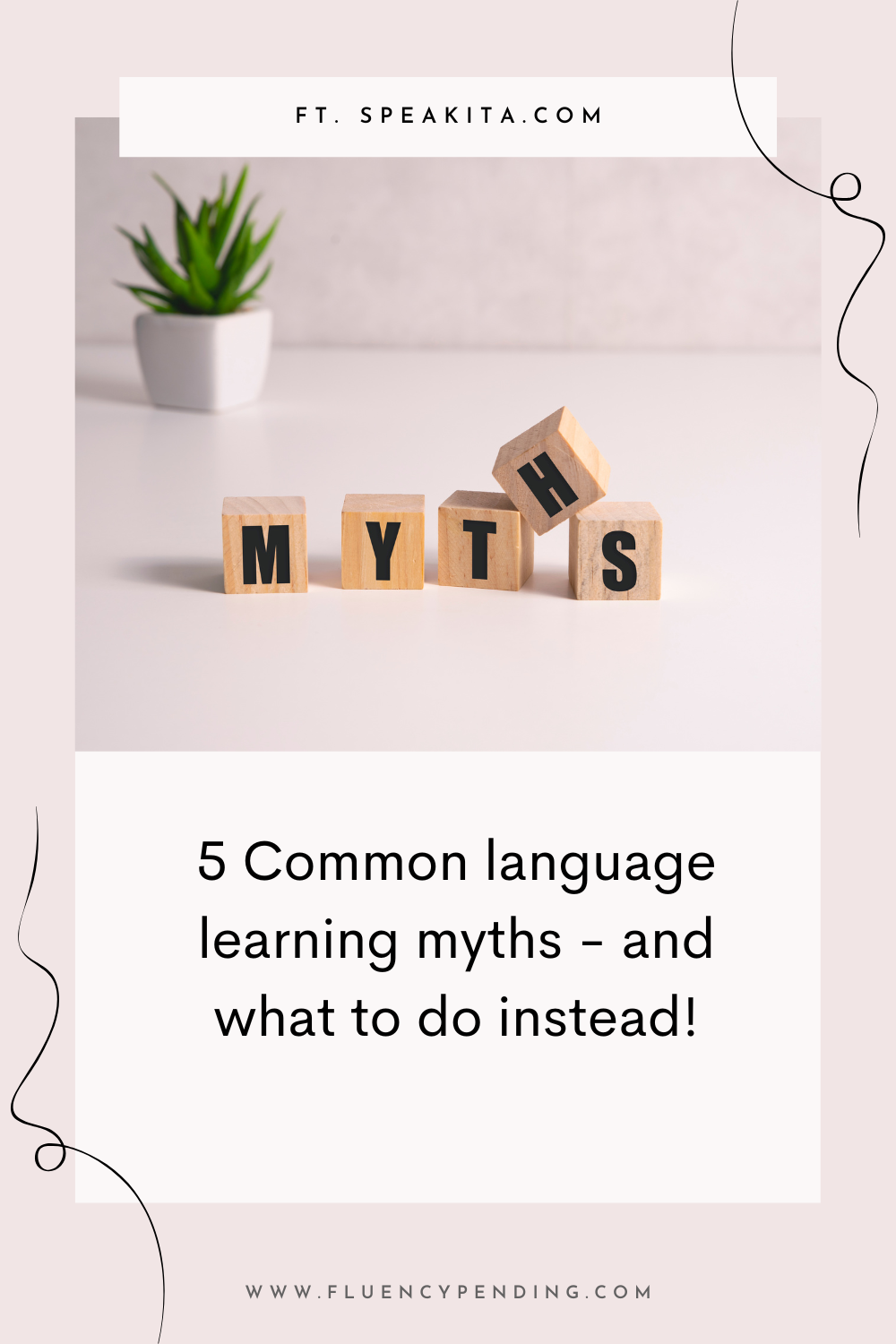
5 Common Language Learning Myths, Debunked
This is a guest post by Gloria from Speakita.com. Gloria helps struggling Italian learners speak Italian fluently and confidently.
If you’ve decided to learn a foreign language, you’ve surely come across many different myths when looking online. Maybe without even knowing that they were myths. Cookie-cutter solutions, secret methods and magic formulas, all things that couldn’t be further from the truth.
Learning a language is actually a long and complex task and it can’t be reduced to a bunch of magic tricks.
In this article, you will learn 5 of the most common language learning myths, why they’re not true and what to do instead.
The truth pill might be harder to swallow but, trust me, it will pay you back with time.
So, if you’re ready to go, here are the 5 myths.
You can learn a foreign language fast
“How to learn [insert language] fast”. That’s one of the most searched keywords on the internet. But is it actually possible?
Short answer: no.
Long answer: Learning a language takes time. Going fast and learning new words every day can give you the illusion that you’re taking steps forward. But the reality is that learning a language (or anything) deeply takes a lot of time, practice, repetition, recalling and attention. And there is no magic formula for that.
So, don’t believe anyone who says that you can learn a language quickly in just a bunch of months, because it will actually take several years to learn it well.
Last but not least, how quickly and easily you learn a language depends on a lot of factors: background knowledge (if you already know any language which is similar to your current target language, for example), motivation, learning opportunities, practice, and a lot of hard work.
You can learn another language without being aware of it
If you’ve heard or read that you can simply play podcast tracks or watch movies and learn a language totally passively, I’m afraid to say that this is not possible. Just because, as kids, we learned our first language without making any effort, it doesn’t mean that we can do the same with our second or third language as adults. Learning our first language is considered biologically primary knowledge, that is knowledge that we acquire naturally thanks to evolution. Whereas second and foreign languages are considered biologically secondary knowledge, that is knowledge that we learn through explanations.
This means that you need a certain level of attention in order to learn another language and you cannot learn it unconsciously, despite how charming this theory may sound.
This doesn’t mean that nothing can be acquired incidentally. Let me explain.
You cannot learn a language without paying attention to new words and grammar rules if you’re starting from scratch, but if you have the right amount of prior knowledge, you can, indeed, learn some words and grammar features by reading.
It seems, in fact, that you can learn a grammar rule of a language unconsciously if you see it often in a text, if this rule is made easy to see, and even more if your first language or other languages that you know have a grammar rule that can help you learn this new one.
And as for vocabulary, there’s a technique with proven benefits: extensive reading. By extensive reading, researchers mean that type of reading that we do for a long period of time (roughly 1 or 2 hours per week) and for the mere purpose of enjoying a book. So, the book that you choose should be at the right level for you (no more than 1 unknown word in every 5 lines, to give you an idea).
And please, keep in mind that if you want to see the benefits of extensive reading, you’ll have to wait a long while, because extensive reading shows its benefits when it’s done in big amounts. And another important point that I would really like you to keep in mind is that words that you learn thanks to extensive reading can easily fade away if you don’t do anything to revise them. So, make sure you revise the words that you find if you want to keep them in your head. And don’t forget that deliberate learning, maybe through flashcards, should always be your ally.
You need to learn according to your learning style
This is a myth that is quite hard to eradicate. Many people out there still believe that we should accommodate our learning styles in order to learn a language better, and you will find a lot of posts teaching you the best learning techniques for visual, auditory and kinaesthetic learners. But this theory has been widely debunked. As learners, we do have preferences in how we want to consume the material, but accommodating our preference doesn’t necessarily mean that we’ll learn best.
This theory, despite being widely believed, is not supported by empirical research. It is true that we process visual, auditory and kinaesthetic information in different parts of the brain, but these parts are interconnected and pass information to one another. So, we cannot really say that just one of these parts is involved.
Learning a language according to your “learning style” will be a waste of time for you. In short, learning styles are nothing but a preference, and if you take them into account when you’re learning a language, you will find yourself wasting a lot of your time and, sometimes, even a lot of money.
Adults can’t learn as well as children
It’s true that children can learn another language really well, especially if they live in the country where this language is spoken. And the younger they are, the more likely they are to sound native-like.
However, if you’re an adult and you’re learning another language while living in your country, you will have fewer opportunities to find input in that language and practice it. But you do have a big advantage: you’ll be better at setting long-term goals, you’ll get to use learning skills that you have already developed while learning other subjects, and you’ll be better at thinking and reflecting about your own learning and be more in control of it.
You will start to speak after listening over and over again
Input is crucial when you’re learning a language, and too little of it will be detrimental to your learning success. But input alone is not enough, even if you read almost everywhere on the internet that “Krashen said that we only need input”. You can understand what you’re hearing in a foreign language, but that doesn’t mean that you will know how to speak that language. Plus, if you don’t speak, you won’t get the benefits that valuable feedback can give you.
We still don’t know the reason why output helps when learning a language, we just know that it’s necessary to start producing it. And there’s something else that can help you become more proficient in another language: interacting with someone else. When you talk with someone else, you have to focus on how to say what you want to say and you get to negotiate meaning. The other person changes their original sentence or you change your original sentence.
To sum up
- It takes several years of hard work in order to learn a language well.
- You need practice, time, repetition, recall, attention, motivation and a lot of learning opportunities.
- You cannot learn another language without paying attention to its words and grammar features.
- You might learn grammar rules incidentally if you find them several times in a text, if they’re easy to see, and if other languages that you know can help you learn that new rule.
- Extensive reading means reading for a long time to something easy for you and for the sole purpose of enjoying the book.
- Easy, in this case, means seeing no more than 1 word in every 5 lines.
- Extensive reading should be done for 1 or 2 hours spread throughout the week.
- To see the benefits of extensive reading, you’ll have to wait a long while and when you do it in big amounts.
- Words that you learn through extensive reading can fade away if you don’t revise them, so go through them using tools like flashcards.
- Learning styles are nothing but a preference and they’re not supported by empirical research.
- If you accommodate your learning style, you will waste a lot of time.
- Children do have a big advantage when learning another language, but as an adult you’ll be better at setting long-term goals, using learning skills that you’ve already developed, and taking more control of your learning.
- Input is a crucial part of language learning but input alone is not enough.
- Understanding a language doesn’t mean that you can speak that language.
- Producing output in another language and interacting in that language help you learn your target language better.
- When you speak, you can benefit from valuable feedback.
- Interaction helps you focus on your words carefully and negotiate meaning with other people.
References
Lethaby Carol, Mayne Russell, Harries Patricia, An Introduction to Evidence-Based Teaching in the English Language Classroom – Theory and Practice, Pavilion ELT, 2021
Nation Paul, What do you need to know to learn a foreign language? School of Linguistics and Applied Language Studies Victoria University of Wellington New Zealand, 2014
Wagstaffe, J.P. & Williams, J. N. (2019). Is it possible to learn a grammar rule in a new language without being consciously aware of it?. OASIS Summary of Williams, J.N. (2005) in Studies in Second Language Acquisition. https://oasis-database.org/concern/summaries/xw42n798h?locale=en

Meet Gloria
Gloria is a teacher of Italian who shares evidence-based strategies and techniques to help her students become confident speakers and learners. She’s passionate about languages, language education, scientific research, human rights, and learning like there’s no tomorrow. In her free time, you can find her at a conference, a museum, around the city on her bike, in her house playing her guitar or studying (of course), or with her friends being her usual silly self.
Connect with Gloria on her website, Facebook, Pinterest, LinkedIn and Instagram.





